Are you afraid of potential dangers but keen to collect your Employment Retention Tax Credit(ERTC)? Avoiding typical ERC errors is essential for tax relief and financial security. This blog will emphasize the common mistakes companies make when applying for ERC funding and go over the requirements you must fulfill for employee retention credit 2023. By avoiding these mistakes, you can increase your chances of obtaining the worthwhile ERC benefits your company deserves.
Claim the ERC Correctly and Avoid Costly Mistakes
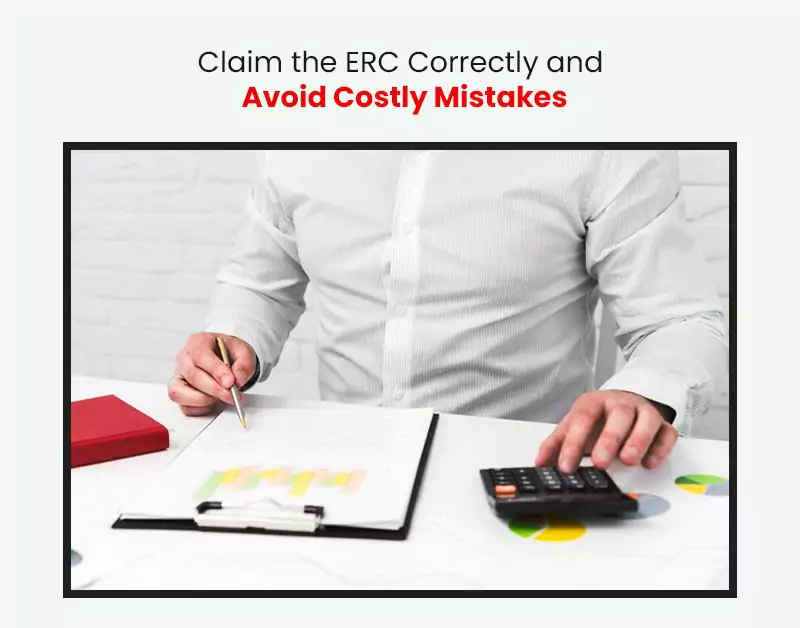
The Employee Retention Credit (ERC) must be adequately claimed to prevent costly errors. To maximize this worthwhile tax benefit, ensure you satisfy all eligibility requirements, including retaining the required documents. Keep thorough records of your qualified earnings, and take care to determine your credit amount accurately. Errors here could result in underclaiming or overclaiming, which could subject your company to fines or audits. You may manage the procedure efficiently and adequately by staying current on the most recent ERC regulations and seeking professional advice from the best ERC company as necessary.
To claim the ERC properly, you must avoid the following mistakes at all costs.
Not understanding the eligibility criteria

Many companies miss the ERC because they need to comprehend the ERC qualifications requirements. Review the IRS regulations carefully and, if necessary, seek advice from a tax expert to avoid making this error. Ensure your company complies with the standards, such as having significantly reduced gross receipts or being forced to close by the government.
Miscalculating the ERC
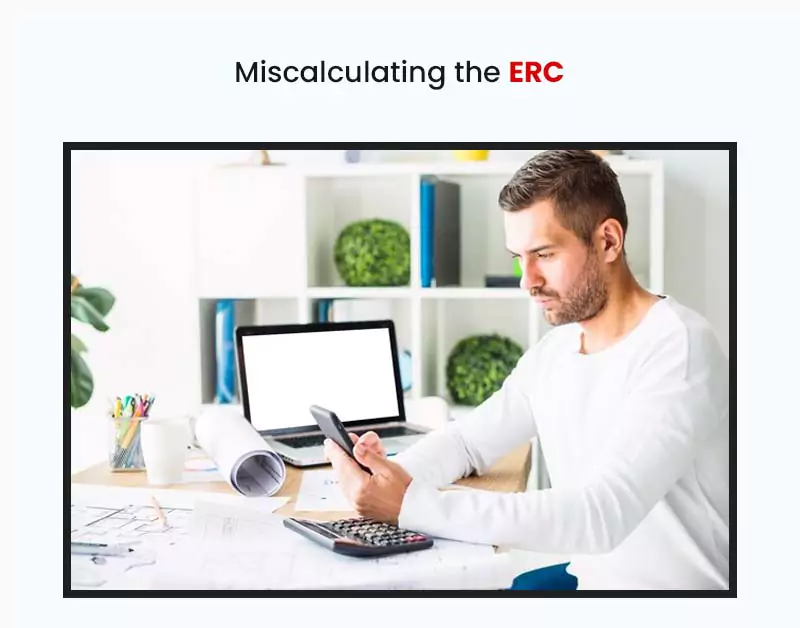
Accurate calculations are necessary to maximize your ERC benefits while you apply for an ERC grant. Two standard errors are using the wrong reference periods or miscalculating the qualified salaries. Double-check your numbers and consider using ERC-specific calculators or software to prevent this error. To ensure accuracy, it’s also advisable to obtain professional advice.
Filing for the ERC incorrectly
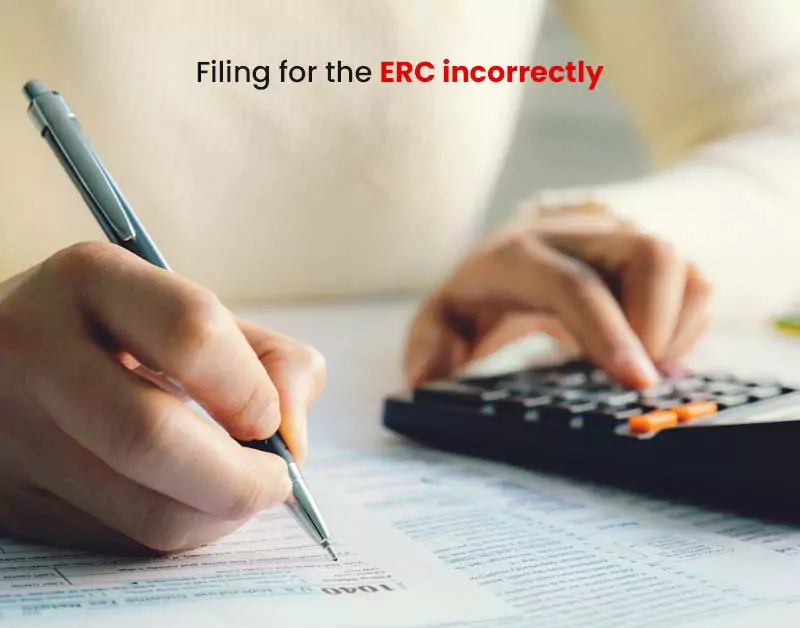
ERC application claims submitted incorrectly or insufficiently may be delayed or rejected. Follow the IRS instructions carefully and make sure you supply all necessary information to prevent making this error. Consider employing specialized software or getting advice from a tax professional who can precisely guide you.
Not keeping adequate records
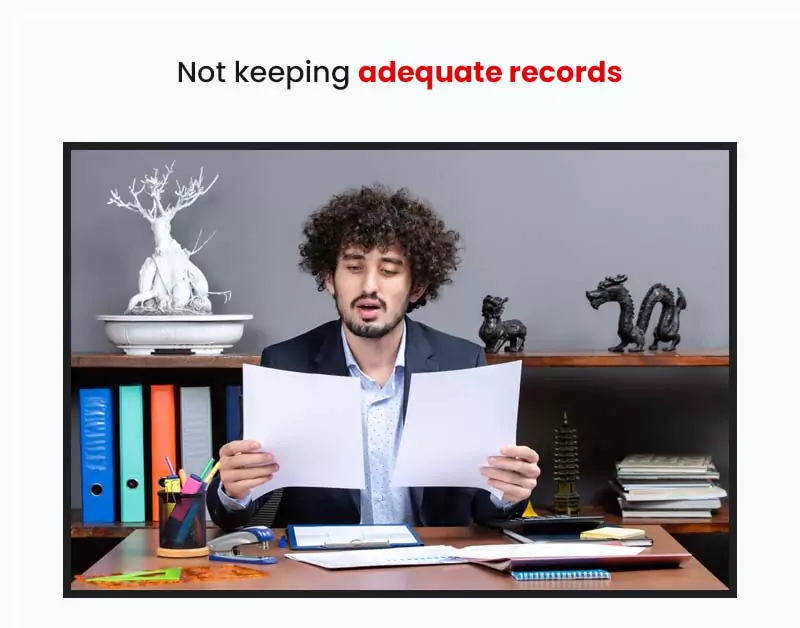
Proper documentation is essential to support your ERC tax credit application. Complicatements arise during an audit if qualifying wages, financial statements, and other pertinent papers need to be kept in order. Create a reliable system for keeping records to prevent this error, and keep all required records for the required time.
Not claiming the ERC on time
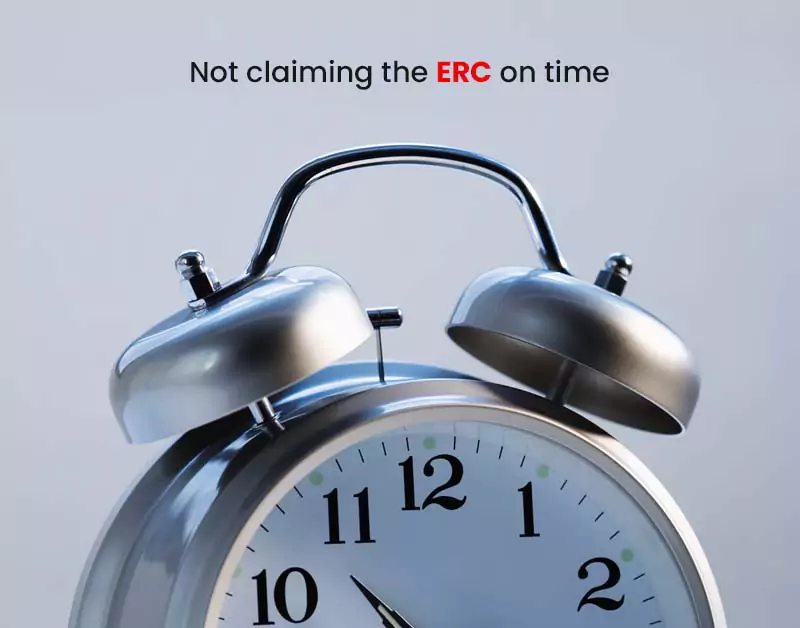
A complete loss of possible credits may arise from missing the dates for claiming the ERC. It’s critical to keep up with the ERC deadline and submit your claims within the allotted time frame. Consider setting reminders or engaging with a tax expert to maintain compliance and optimize your benefits.
Failing to Document Properly

The foundation of an effective ERC claim is proper documentation. You risk issues during audits or disagreements with the IRS if you don’t keep thorough records. An ERC company creates a strategy for meticulous recordkeeping to avoid this pitfall. Keep track of all the paperwork connected to your ERC claim, including payroll records, financial accounts, and records of eligible wages. For the statutory retention period, keep these records structured and accessible. In addition to assisting you in claiming the employee retention tax credit services, appropriate documentation also offers protection in the event of audits.
Claiming Wages that Aren’t Qualified

Claiming salaries that don’t match IRS eligibility requirements is one of the most frequent ERC errors. Ensure you know the IRS’s rules for eligible wages to avoid making this mistake. Make sure you correctly classify the wages that are eligible for the credit and those that are not. For instance, some wages and fringe perks given to family members need to be revised.
Review your payroll records carefully, and if you have any questions regarding specific wage classifications, seek advice from tax experts. You can maximize your ERC while avoiding potential difficulties by claiming eligible salaries.
Not Seeking Professional Advice

ERC policies and procedures can be intricate and dynamic. Depending only on your knowledge or the advice of your internal staff could result in mistakes. Refraining from underestimating the usefulness of expert counsel is a standard error. Consider speaking with ERTC consultants to steer clear of this error. These experts stay current on ERC standards and recent changes to tax regulations.
With their assistance, you can take advantage of your credits, assure compliance, and manage the ERC claim procedure. The potential benefits and peace of mind surpass any costs of getting professional guidance.
Tips to avoiding ERC mistakes:

By implementing these tips, you can confidently navigate the ERC process, minimize errors, and maximize your tax credits. Avoiding common ERC mistakes ensures a smoother experience and a healthier bottom line for your business.
- Stay Up To Date: Know the most recent ERC rules and regulations. Staying informed about tax regulations guarantees you know any new prerequisites or eligibility requirements.
- Complete Documentation Details: Keep meticulous records of your legal salaries, payroll reports, bank accounts, and other pertinent papers. In addition to supporting your ERC claim, proper documentation makes the audit process more accessible if necessary.
- Understanding Qualified Wages: Spend time learning which wages are eligible for the ERC and which are not. Claiming unqualified wages in error might result in disagreements and delays with your ERC refund.
- On-Time Claim Submission: Don’t put off submitting your ERC claim; do it right now. To quickly receive your tax credits, you must act promptly. Delays may cause refund opportunities to be lost.
- Professional Advice: Think about speaking with ERC experts or tax experts. They are skilled at navigating the complex ERC environment, guaranteeing compliance, and maximizing your credits while avoiding costly errors.
- Internal Audits: Internal audits that are conducted regularly should look at your ERC records and claims. This self-audit can aid in spotting faults before they turn into more significant problems and offer a chance for changes.
- Education and Training: Invest in the education and training of your financial and HR personnel. Well-informed employees are less likely to make payroll and reporting mistakes, which lowers the possibility of ERC errors.
- Consult the IRS for Advice: The IRS offers advice and resources on their website. Feel free to contact them with questions or concerns about ERC tax credit eligibility or documentation.
Get the Most Out of the ERC with Expert Help

Employee Retention Credits (ERC) are a complex topic that requires expert knowledge. ERC rules and criteria may seem difficult to the average individual. It is wise to get professional assistance to maximize the value of your ERC claims and prevent expensive errors. Understanding qualified salaries, complying with changing tax rules, and the complexities of correct recordkeeping are just a few of the ERC’s complexities. With the professional advice of the tax consultants, it’s easier to overlook potential credits or run afoul of compliance requirements.
Regarding ERC expertise from a renowned ERC agency, consult professionals at R&R Agency. We understand the ever-changing landscape of ERC regulations, ensuring you receive the maximum credits while remaining fully compliant. With our guidance, you can streamline your ERC claims, avoid costly errors, and secure the financial benefits your business deserves. Trust our employee retention credit consultants to handle the complexities of ERC while you focus on growing and sustaining your business. Choose us to experience unparalleled ERC support and ensure you maximize this valuable tax credit.
FAQs about ERC Common Mistakes
Conclusion
Avoiding frequent ERC claim blunders is essential for companies wishing to optimize their tax credits and successfully negotiate the deep waters of employee retention credits. Businesses can get the financial relief they require while avoiding costly mistakes by staying informed and on guard. Remember that the ERC presents worthwhile chances for firms, but it is crucial to go through it carefully and precisely.


